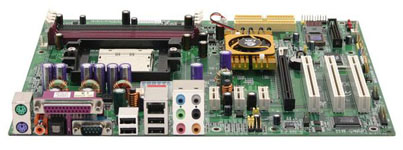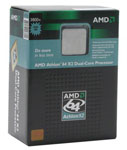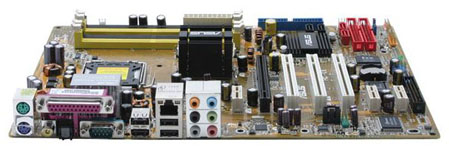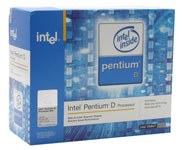Mid-Range Buyer's Guide, September 2005
by Jarred Walton on September 19, 2005 12:05 AM EST- Posted in
- Guides
Office CPU and Motherboard Recommendations
For the non-gaming configurations (which we're loosely terming "office" here), our motherboard and processor picks are very different. While dual core at present does little to nothing for gaming other than to increase costs (or allow you to run applications in the background while gaming), the same is not true of non-gaming applications. Many professional business applications are already optimized to support SMP (Symmetric Multi-Processing - in other words, multiple CPU cores) configurations. Video encoding, image editing, 3D rendering, and software development can all take advantage of the second CPU core. At the same time, even the cheapest of modern graphics cards is more than sufficient for most non-gaming work. There's a reason why Intel currently has more installed graphics chips than anyone else: for business use, integrated graphics are perfectly adequate. Multitasking will also benefit from the addition of a second CPU core, so burning a DVD while surfing the web, running your virus scanner, etc. shound't be a problem.
Here, Intel has the clear advantage, simply in terms of pricing. While the Intel Pentium D chips are not as fast as the AMD X2 chips, we're less concerned with maximum performance than we are with having a second core. DVD burning and web browsing aren't going to max out even a single CPU core, but the context switching that the CPU has to do in order to run both tasks at the same time can have an impact (especially under Windows XP). If you're running two CPU intensive tasks, of course, dual cores will be tremendously helpful. We've labeled this setup as "Office", but it is also useful for non-business tasks, with DVD playback/ripping/encoding, PVR duties, and even moderate gaming topping the list. In short, they're good systems for homes as well as businesses.
AMD Office Motherboard: EPoX EP-9NPA+Ultra
Price: $98 shipped
AMD Office CPU: Athlon 64 X2 3800+ 2x512K 2.0GHz
Price: $361 shipped (Retail)
Total: $459
If gaming isn't a primary concern, the use case for SLI is greatly diminished. Sure, you can use the second slot for a non-graphic device, but most of those will be fine in an X1 or X2 slot instead. Given the current price premium for SLI boards - especially the higher-quality boards - we're going to skip that for our business configuration. The EPoX EP-9NPA+Ultra received top marks in our nForce4 Ultra Roundup, and at under $100, it's a great bargain. Paired with the lowest priced Athlon X2 part, the 3800+, we still end up spending around $150 more for the motherboard and CPU relative to our Gaming configuration, but we'll save that money elsewhere. This is a potent combination and should meet just about any business/home needs for several years. About the only additions that might be required in the next year or two are a new graphics card, more data storage, and/or more RAM. (You'll probably be upgrading the OS at some point as well.)
While we've said that Intel has the pricing advantage, we really need to qualify that statement. Yes, the X3800+ is substantially more expensive than the Pentium D 820 (and even the 830 is cheaper). The quality Intel motherboards do cost a bit more, however, making the Pentium D 830 a roughly equal price. If you look at the single core foundation of the parts rather than the model number, though, you get some interesting details. A single 2.0GHz 512K AMD core is called the 3200+, making it roughly the equal of the Pentium 4 540 3.2GHz. Two of these cores comprise the X2 3800+, while two 3.2GHz Prescott cores make the Pentium D 840. The 840 actually retails for substantially more than the X2 3800+, so comparing the 3800+ and the 820 is hardly fair. While there are a few applications where the Pentium D wins out in raw performance, the X2 3800+ is definitely the faster chip overall, and it runs cooler as well.
Raw performance isn't really that important for most home users, though. If you'll pardon my anecdote for a minute, I frequently use a Pentium III 1.13GHz with 512MB of RAM, and Word and Excel have no trouble keeping up with my typing speed. Web page rendering on such an old system can be quite a bit slower, but the point is that the majority of what an office computer will do is to sit around waiting for user input. We're not going to list alternatives here, as we really don't feel that anything more expensive is worth considering. You could probably stick with the 3000+ chip and be fine, but the second core is nice to have if/when you need it. You can also overclock the 3800+ quite a bit, with 2.4GHz being a relatively easy mark. That would give you a 4600+ equivalent, and very few home systems can come anywhere near that level of performance, dual core or otherwise.
Intel Office Motherboard: ASUS 945P P5LD2
Price: $132 shipped
Intel Office CPU: Pentium D 820 2x1MB 2.8GHz
Price: $248 shipped (Retail)
Total: $380
Our Intel office choices are similar in some ways to the gaming choices. We once again selected an ASUS motherboard, this time using the 945P chipset. You could get any of the Intel 945P or Intel 945G based motherboards and be reasonably safe in terms of stability, but we do like the added features that ASUS provides, and a quality motherboard is arguably the most important component when it comes to system reliability.
For the processor, we went with the cheapest Intel dual core part. As we mentioned above, this is not at all a fair match in terms of performance, as the AMD chip will easily beat the 820 in pretty much every benchmark. However, given the choice between the Pentium 650 and the 820 for office work, we'd take the 820. If you're looking at the $380 price of this configuration and comparing it with the $459 of the X2 setup, that's a decent savings. We won't actually "save" that money, however, but instead we'll use it to upgrade other aspects of the system.
Alternatives are plentiful for the motherboard. If you just want stock performance, the ECS 945P 945P-A and Biostar I945P-A7 come in at under $100. (We'd guess that ECS actually makes the board for Biostar, although we could be wrong.) Both of those have a second physical X16 slot, but it's only an X1 or perhaps X2 data connection. It can't be used for SLI or for Crossfire at present, but driver updates in the future could very well change that. On the processor side, you could upgrade to the 830 for another $65, coming close to the same cost as the X2 configuration. The extra 200MHz really isn't worth the cost in our opinion, and as we said, we have other plans for the money....
For the non-gaming configurations (which we're loosely terming "office" here), our motherboard and processor picks are very different. While dual core at present does little to nothing for gaming other than to increase costs (or allow you to run applications in the background while gaming), the same is not true of non-gaming applications. Many professional business applications are already optimized to support SMP (Symmetric Multi-Processing - in other words, multiple CPU cores) configurations. Video encoding, image editing, 3D rendering, and software development can all take advantage of the second CPU core. At the same time, even the cheapest of modern graphics cards is more than sufficient for most non-gaming work. There's a reason why Intel currently has more installed graphics chips than anyone else: for business use, integrated graphics are perfectly adequate. Multitasking will also benefit from the addition of a second CPU core, so burning a DVD while surfing the web, running your virus scanner, etc. shound't be a problem.
Here, Intel has the clear advantage, simply in terms of pricing. While the Intel Pentium D chips are not as fast as the AMD X2 chips, we're less concerned with maximum performance than we are with having a second core. DVD burning and web browsing aren't going to max out even a single CPU core, but the context switching that the CPU has to do in order to run both tasks at the same time can have an impact (especially under Windows XP). If you're running two CPU intensive tasks, of course, dual cores will be tremendously helpful. We've labeled this setup as "Office", but it is also useful for non-business tasks, with DVD playback/ripping/encoding, PVR duties, and even moderate gaming topping the list. In short, they're good systems for homes as well as businesses.
 |
 |
| Click to enlarge. | |
AMD Office Motherboard: EPoX EP-9NPA+Ultra
Price: $98 shipped
AMD Office CPU: Athlon 64 X2 3800+ 2x512K 2.0GHz
Price: $361 shipped (Retail)
Total: $459
If gaming isn't a primary concern, the use case for SLI is greatly diminished. Sure, you can use the second slot for a non-graphic device, but most of those will be fine in an X1 or X2 slot instead. Given the current price premium for SLI boards - especially the higher-quality boards - we're going to skip that for our business configuration. The EPoX EP-9NPA+Ultra received top marks in our nForce4 Ultra Roundup, and at under $100, it's a great bargain. Paired with the lowest priced Athlon X2 part, the 3800+, we still end up spending around $150 more for the motherboard and CPU relative to our Gaming configuration, but we'll save that money elsewhere. This is a potent combination and should meet just about any business/home needs for several years. About the only additions that might be required in the next year or two are a new graphics card, more data storage, and/or more RAM. (You'll probably be upgrading the OS at some point as well.)
While we've said that Intel has the pricing advantage, we really need to qualify that statement. Yes, the X3800+ is substantially more expensive than the Pentium D 820 (and even the 830 is cheaper). The quality Intel motherboards do cost a bit more, however, making the Pentium D 830 a roughly equal price. If you look at the single core foundation of the parts rather than the model number, though, you get some interesting details. A single 2.0GHz 512K AMD core is called the 3200+, making it roughly the equal of the Pentium 4 540 3.2GHz. Two of these cores comprise the X2 3800+, while two 3.2GHz Prescott cores make the Pentium D 840. The 840 actually retails for substantially more than the X2 3800+, so comparing the 3800+ and the 820 is hardly fair. While there are a few applications where the Pentium D wins out in raw performance, the X2 3800+ is definitely the faster chip overall, and it runs cooler as well.
Raw performance isn't really that important for most home users, though. If you'll pardon my anecdote for a minute, I frequently use a Pentium III 1.13GHz with 512MB of RAM, and Word and Excel have no trouble keeping up with my typing speed. Web page rendering on such an old system can be quite a bit slower, but the point is that the majority of what an office computer will do is to sit around waiting for user input. We're not going to list alternatives here, as we really don't feel that anything more expensive is worth considering. You could probably stick with the 3000+ chip and be fine, but the second core is nice to have if/when you need it. You can also overclock the 3800+ quite a bit, with 2.4GHz being a relatively easy mark. That would give you a 4600+ equivalent, and very few home systems can come anywhere near that level of performance, dual core or otherwise.
 |
 |
| Click to enlarge. | |
Intel Office Motherboard: ASUS 945P P5LD2
Price: $132 shipped
Intel Office CPU: Pentium D 820 2x1MB 2.8GHz
Price: $248 shipped (Retail)
Total: $380
Our Intel office choices are similar in some ways to the gaming choices. We once again selected an ASUS motherboard, this time using the 945P chipset. You could get any of the Intel 945P or Intel 945G based motherboards and be reasonably safe in terms of stability, but we do like the added features that ASUS provides, and a quality motherboard is arguably the most important component when it comes to system reliability.
For the processor, we went with the cheapest Intel dual core part. As we mentioned above, this is not at all a fair match in terms of performance, as the AMD chip will easily beat the 820 in pretty much every benchmark. However, given the choice between the Pentium 650 and the 820 for office work, we'd take the 820. If you're looking at the $380 price of this configuration and comparing it with the $459 of the X2 setup, that's a decent savings. We won't actually "save" that money, however, but instead we'll use it to upgrade other aspects of the system.
Alternatives are plentiful for the motherboard. If you just want stock performance, the ECS 945P 945P-A and Biostar I945P-A7 come in at under $100. (We'd guess that ECS actually makes the board for Biostar, although we could be wrong.) Both of those have a second physical X16 slot, but it's only an X1 or perhaps X2 data connection. It can't be used for SLI or for Crossfire at present, but driver updates in the future could very well change that. On the processor side, you could upgrade to the 830 for another $65, coming close to the same cost as the X2 configuration. The extra 200MHz really isn't worth the cost in our opinion, and as we said, we have other plans for the money....










56 Comments
View All Comments
flatblastard - Tuesday, September 20, 2005 - link
I'll be looking forward to reading this article, maybe we can clear some of this confusion up.ksherman - Monday, September 19, 2005 - link
you mentioned that XP Pro will have no problem with a dual core processor. If I were to upgrade my current computer with a 3800+, will I have to reinstall my OS? everything else will remain constant.JarredWalton - Monday, September 19, 2005 - link
It depends in a large part on your current setup. Worst case scenario, you'd probably have to do a repair installation over your current OS. Actually, worst case you hose your current OS and start from scratch, but 99% of the time that's not required.Furen - Monday, September 19, 2005 - link
You are very likely to be able to pull off a CPU swap without problems but if you have those weird speed-up/slow-down problems that some people seem to be having in certain games (and you cant fix them using the X2 driver), then a clean install will probably fix that for you.2ndRUNNER - Monday, September 19, 2005 - link
I would rather buy an entry-level PC for doing most of my jobs
and save $400 or more (on graphic, SLI mobo, CPU, etc.)
to buy a console dedicated to pure gaming. In this way, I can
enjoy the best of both worlds since all major game companies
are moving to consoles. In addition, I feel more comfortable
watching DVD, seeing my photos, listening to music, recording
TV programs and definitely, playing games with friends on my sofa.
yacoub - Monday, September 19, 2005 - link
Hmmm let's see:I like to watch TV while I use the computer. I can't play a console and watch TV as easily, let alone hear the news in the background while I play.
My TV is too old to really provide a worthy display for a modern console. So that means spending $1000-2000 for a nice TV.
I tend to prefer PC games for their greater depth, functionality (due to more buttons to bind and flexibility in how you assign them), modability, map/level-making, community, etc. Many things not offered on console games.
Until there is a trackball for controlling 'mouselook', a console controller is rubbish for FPS gaming, period.
A lot of the games I play today are older games that definitely won't be seen on a console anytime soon or simply wouldn't port well anyway due to their complexity (MechWarrior4:Mercenaries w/ MekTek add-on, MechCommander2 w/ Wolfman's add-on, Rome: Total War, etc).
So why would I: Give up the gaming I have now (my current rig needs an upgrade soon in order to continue gaming on it, so if I buy a console and TV I'm foregoing that), buy into an expensive proposition for future gaming that likely won't include many of the games I'd be interested in, and thus end up with less than what I started?
It just doesn't make sense. Not yet. The XBox360 is coming closer, for sure, but until they provide a trackball & keyboard setup including button configuration (heck, let me use my current USB ones from my PC) and content-identical ports of PC games, I won't be sold on using a console for ALL of my gaming wants.
yacoub - Monday, September 19, 2005 - link
Oh and then there's the realization that the Z-680s probably won't cut it for audio output for the TV and it'd be home theatre audio system time. Yeah right. That's so far out of my budget right now...bob661 - Monday, September 19, 2005 - link
The Z-5500's work perfectly for home audio use. There's an optical input on the controller. Works great.yacoub - Tuesday, September 20, 2005 - link
Yes, they're the same as my Z-680s, I'm just saying that they are still PC speakers, not home audio quality speakers. Compared to the other PC speaker options, they're excellent, but they don't stack up to home audio, trust me.JarredWalton - Monday, September 19, 2005 - link
People obviously have differing tastes. Personally, I hate console controllers. I was over at a friend's place tonight and we tried Conker: Reloaded on the Xbox. The pathetic controls are just a great way to mask non-existent AI, as far as I can tell. If I spent a lot more time with consoles, I'd certainly improve, but I don't think I could ever reach the same skill level as a mouse/keyboard FPS player.That's somewhat beside the point, though, when I consider the games I actually play and enjoy the most. FPS games are great, but a good strategy game often lasts longer on my HDD than the latest FPS. Point to a console game that can compete with Civilization III. (Imagine trying to control such a game without a mouse....)
There's room for both types of gamers, and frankly I doubt I'll get any of the next gen consoles. They just don't appeal to *me*.